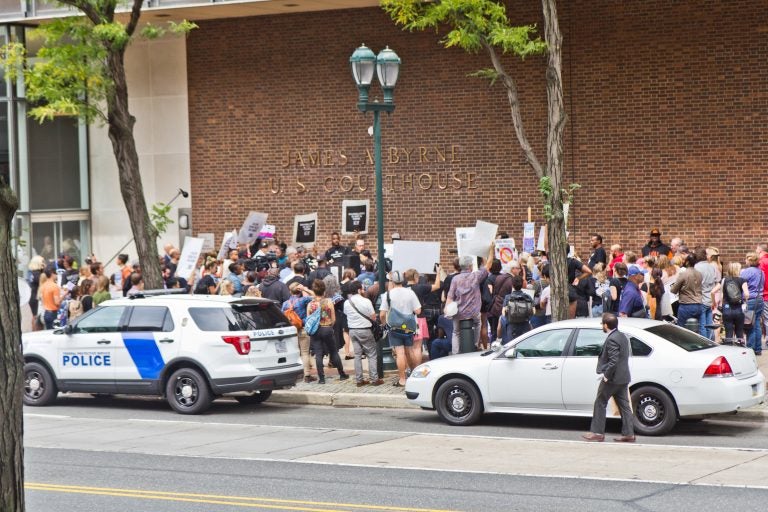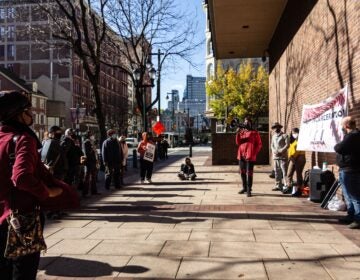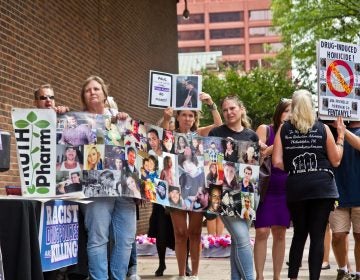Federal judge dismisses Philadelphia Safehouse case, which sought a legal pathway for supervised injection sites
Safehouse leaders say they are reviewing their options and next steps, which could include filing an appeal. The lawsuit was first filed in 2019.
Listen 1:04
File - Supervised injection site supporters in Philadelphia rallied outside a federal hearing Thursday to determine if the proposed Safehouse would violate the federal Controlled Substances Act. (Kimberly Paynter/WHYY)
From Philly and the Pa. suburbs to South Jersey and Delaware, what would you like WHYY News to cover? Let us know!
A United States District Court judge in Philadelphia has dismissed a case involving the nonprofit organization Safehouse, which fought for a federal legal right to open and operate supervised injection sites for people who use drugs.
Safehouse’s case against the U.S. Justice Department hinged on arguments that its plans were protected from federal drug laws on religious grounds and the First Amendment.
In court documents filed Wednesday, Judge Gerald McHugh in the Eastern District of Pennsylvania said he was “persuaded” that Safehouse is not a religious entity and granted the DOJ’s request to dismiss the case.
“The organizers and leaders of Safehouse profess religious motivation, but the work of Safehouse itself is in no respect religious,” McHugh wrote in his judgment.
Attorneys for Safehouse said they are reviewing their options and next steps, which could include filing an appeal to McHugh’s dismissal.
In a statement, Safehouse leaders said they “respectfully disagree with the judge and believe federal law permits Safehouse to exercise its religious beliefs by saving the lives of people in need.”
City data show that 5,053 people in Philadelphia have died from drug overdoses since 2019, when the Trump administration first sued Safehouse. The death toll does not yet include fatal overdoses in 2023.
“As the Judge wrote in his opinion, the public health crisis continues unabated,” Safehouse leaders stated. “Amid this crisis, federal and local government have not taken the steps to provide relief.”
For now, the decision brings an end to the latest chapter of Safehouse’s years-long pursuit to establish a legal pathway for supervised injection sites, also called safe consumption or overdose prevention centers.
These centers, where people can bring and use drugs under the supervision of professionals who can intervene to prevent fatal overdoses, are considered illegal under the federal Controlled Substances Act.
They’ve also faced intense local opposition. In Philadelphia, the City Council passed a near-total ban on future sites in nine of the city’s 10 districts.
Other cities and states have moved in the opposite direction. Nonprofit OnPoint NYC established the country’s first two public sites in 2021 in New York City with approval from local and state leaders. Since opening, the sites have reversed 1,452 drug overdoses, according to the organization.
“They have connected people to treatment for substance use and mental and physical health needs, and housing,” Safehouse leaders stated. “We could be doing the same in Philadelphia.”
Another facility is projected to open in Rhode Island this year.
However, these sites remain vulnerable to federal prosecution in the absence of any exception or protection from federal drug laws, which make it a crime for anyone to open or maintain a place for the purpose of manufacturing, distributing or using drugs.
Safehouse was once poised to open the nation’s first facility in Philadelphia before it was sued by the Trump administration. A federal appeals court ruled in 2021 that the operation of such sites violated federal law.
Within the same lawsuit, the Philadelphia nonprofit pursued an argument that religious motivations and beliefs in preserving life were at the core of the organization’s goal to open a site.
McHugh rejected this argument but expressed sympathy for the organization’s purpose.
“The noble intentions of Safehouse and its founders are self-evident, and the public health crisis they seek to address continues unabated,” McHugh wrote in court documents. “But their religious inspiration does not provide a shield against prosecution for violation of a federal criminal statute barring its operation.”

Get daily updates from WHYY News!
WHYY is your source for fact-based, in-depth journalism and information. As a nonprofit organization, we rely on financial support from readers like you. Please give today.





